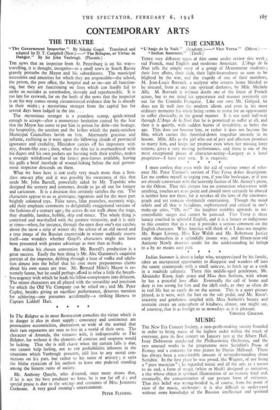THE CINEMA
"L'Ange de la Nuit." (Academy.)—" Vice Versa." (Odeon.)— "Indian Summer." (Tivoli.) THREE very different types of film come under review this week ; sad French, mad English and moderate American. L'Ange de la Nuit tells the simple story of a group of Montmartre students ; their love affairs, their club, their light-heartedness so soon to be blighted by the war, and the tragedy of one of their members, M. Jean-Louis Barrault, a sculptor who returns home blinded to be rescued, from at any rate spiritual darkness, by Mlle. Michele Alfa. M. Barrault is without doubt one of the finest of French actors, but to my mind his appearance and manner positively cry out for the Comedic Francaise. Like our own Mr. Gielgud, he does not fit well into the modern idiom, and even in his most ordinary moments his whole being seems to yearn for an opportunity to suffer classically, in the grand manner- It is not until half-way through L'Ange de la Nuit that he is permitted to suffer at all, and then it is quietly, with sudden bursts of irritability, as befits the age. This does not become him, or rather it does not become the film, which carries this throttled-down tragedian uneasily in its bosom. Mlle. Alfa as the girl who out of pity and affection promises to marry him, and keeps her promise even when her missing lover returns, gives a very moving performance, and there is one of the most exceptional pieces of character-acting—Larquey as a hotel proprietor—I have ever seen. It is exquisite.
* * I must confess that even with the aid of various tomes of refer- ence Mr. Peter Ustindv's version of Vice Versa defies description. Let me confine myself to urging you, if you like burlesque, or if you are already conversant with the heavenly fustian of Mr. Anstey's prose, to the Odeon. That this picture has no connection whatsoever with anything, touches art at no point and should most certainly be abused is neither here nor there, for it revokes all the laws of the cinemato- graph and yet remains obstinately entertaining. Though the mind rebels and all that is fastidious, sophisticated and critical in one's make-up cries, "Oh, no!" the laughter rumbles upwards in un- controllable surges and cannot be gainsaid. Vice Versa is sheer lunacy couched in splendid English, and it is a lunacy so indigenous to this country that in a way it provides a serious comment on the English character. What America will think of it I dare not imagine. Mr. Roger Livesey, Miss Kay Walsh and Mr. Robertson Justice enjoy themselves in a splendidly insane way, and fifteen-year-old Anthony Newly deserves credit for the understanding he brings to a by no means easy part.
Indian Summer is about a judge who, unappreciated by his family, takes an unexpected opportunity to disappear and wanders off into the sunny countryside with a small suitcase, to fetch up as a cook in a roadside cafeteria. There this middle-aged gentleman, Mr. Alexander Knox, finds peace and Miss Ann Sothern, with whom he has a peaceful love affair. Eventually the call of home and duty is too strong for him and the idyll ends, as they so often do in real life but so rarely do on the screen. This is a quiet picture played, as it were, with the foot on the soft pedal, and Mr. Knox's sincerity and gentleness coupled with Miss Sothern's beauty and restraint create an atmosphere of kindness, almost, one might say, of courtesy, that is as foreign to us nowadays as it is pleasant.
VIRGINIA GRAHAM.






























 Previous page
Previous page